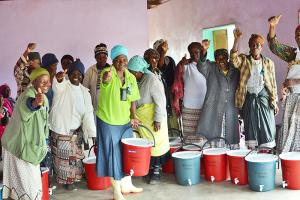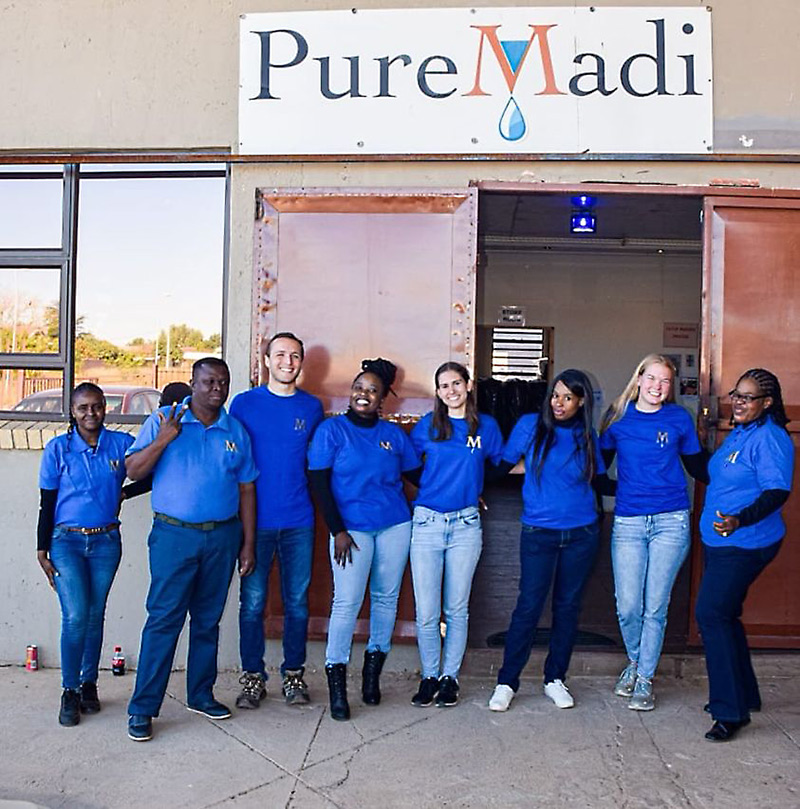
In rural South Africa, as in much of the world, clean water is hard to come by without creativity. The water that most South Africans drink is untreated or only partially treated, explained James A. Smith, Henry L. Kinnier Professor of Civil Engineering.
“When there’s no chlorination, there’s lots of coliform bacteria,” he said. “It’s a huge problem. It manifests in diarrhea, dehydration and death, particularly with children under five. Even if they’re lucky enough to live, there’s growth stunting and cognitive impairment. These are well-known symptoms of poor-quality water.”
In the name of creative, sustainable and affordable solutions for water quality, Smith has dedicated his career to studying point-of-use filtration technologies that allow families to purify the water running from their tap from within their own households. In 2011, he founded nonprofit organization PureMadi to zero in on one such solution: silver-ceramic filters.
The Impact of PureMadi: More Than a Decade of Progress
In the 13 years since, PureMadi has distributed 6,000 silver-ceramic filters made by and for South Africans — serving upwards of 30,000 people — while providing water quality and hygiene education to 350 children via school visits, creating 30 local jobs, and engaging 500 volunteers and supporters.
With PureMadi’s annual fundraising event taking place at Alumni Hall on Feb. 2, Smith is thinking most about the future of the people at PureMadi. He hopes the organization will achieve financial sustainability and growth that ultimately serves the local workers behind it.
“What we’re trying to do is provide safe water and create jobs in the community,” Smith said.
At PureMadi’s new production facility in Hammanskraal, South Africa, the production team fires up a massive kiln at 900 degrees Celsius to sinter clay and combust sawdust, forming porous ceramic filters that they then paint with a colloidal silver solution. The porous ceramic removes larger particles, while silver ions released by the painted-on solution disinfect microbial pathogens. This one-two punch can remove 99 percent of bacteria from water, per PureMadi.
With support from donors, PureMadi has delivered free silver-ceramic filters to schools, nursing facilities, and churches in rural communities. But as demand grows from individual households in larger communities like those of Cape Town, the organization aims to boost its sales capacity as well. One of the main goals of this shift in focus is to allow filter sales to provide PureMadi’s workers, most of whom are women from rural areas, with salaried jobs.

Empowering Growth: PureMadi’s Strategic Shift
Events like the PureMadi fundraiser are critical to pushing the organization closer to this state of self-sufficiency, Smith said. “It’s challenging, but that’s what we’re working toward,” he said.
To get there, the organization recently brought on its first sales manager, Mukhethwa Mannzhi, who studied local water quality issues closely while earning her master’s degree in hydrology and water resources from the University of Venda. Mannzhi had worked with PureMadi in the course of her research in 2022, participating in a field study on the effects of water filter usage on household water quality in the village of Tshibvumo, before she was hired in 2023.
Smith hopes to add to the organization’s full-time production team and build a sales team to support Mannzhi. Right now, PureMadi is producing and distributing about 100 to 150 filters a month. Smith aims to get that number up to 500 or even 1,000 filters per month. As filter sales go up, he envisions expanding geographically.
“Our goal is to create a blueprint for a successful facility — including its architecture and efficiency of water and energy use — along with technological performance of the filter itself and an effective and sustainable business model,” Smith said.
In the meantime, Smith and his colleagues at the University of Virginia will continue to study creative solutions for clean water. Over the past decade, 100-plus UVA students have volunteered with PureMadi and helped conduct international research on silver-ceramic filters and other point-of-use water filtration technologies.
In 2022, doctoral student Jamie Harris and undergraduate engineering students Maya Reese and Karin Brett traveled to South Africa to study how point-of-use filtration systems like PureMadi’s silver-ceramic filters benefit from the addition of the MadiDrop+, a water purification tablet that Smith invented, which can treat more than 7,000 liters of water over its 12-month lifespan.
“That’s another real, tangible benefit of PureMadi, beyond what we’re doing in South Africa,” Smith said. “All the knowledge we’ve gained through research and the experiences we’ve given our students has been quite remarkable.”
The PureMadi celebration and fundraiser on Friday, Feb. 2 at Alumni Hall. Tickets can be purchased at www.puremadi.org.